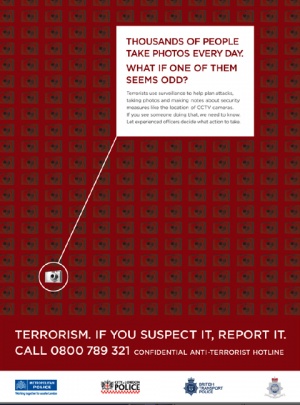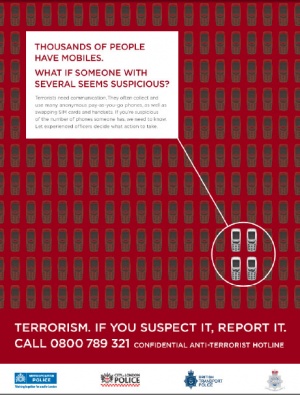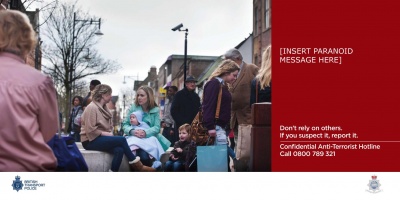Difference between revisions of "2008 Counter-Terrorism advertising campaign"
(→Stakeholders in Campaign) |
(→Stakeholders in Campaign) |
||
| Line 41: | Line 41: | ||
* The [[Home Office]] | * The [[Home Office]] | ||
* The Mayor's Office | * The Mayor's Office | ||
| − | * The Security Services [[MI5]] and [[MI6]] | + | * The Security Services - [[MI5]] and [[MI6]] |
* Emergency Services | * Emergency Services | ||
* [[Association of Chief Police Officers]] (ACPO) | * [[Association of Chief Police Officers]] (ACPO) | ||
Revision as of 01:30, 14 August 2010

This article is part of the Counter-Terrorism Portal project of Spinwatch. |
<youtube size="small" align="right" caption="Audio Recording of Banned Radio Advert that appeared on Talksport. Retrived on 12.08.10">lQubNQ5-ULc</Youtube>
In 2008, the Metropolitan Police and the police forces of Greater Manchester, West Yorkshire and the West Midlands launched a five-week poster and radio campaign to get members of the public to report any “suspicious behaviour” they may have encountered in their daily lives to the Anti-Terrorist Hotline. The slogans of the campaign were – “if you suspect it, report it” and “Terrorists won’t succeed if someone reports suspicious activity – you are that somebody”.[1]
The campaign became known for its poster campaign, which had simplistic and wide-sweeping slogans such as:[2]
- “Thousands of people have mobiles. What if someone with several seems suspicious?”
- “You see hundreds of houses every day. What if one has unusual activity and seems suspicious?”
- “Thousands of people take pictures every day. What if one of them seems odd?”
Contents
Police Rationale for Campaign
The rationale behind the poster campaign was explained by the lead-agency that devised the campaign, the Metropolitan Police, who suggested that the campaign was crucial because even though the public of London was aware of terrorism issues , they lacked “alertness”. When Londoner’s thought about terrorism, they thought of “’bombs on tube/bus’, ‘man with rucksack’ because of past events. Their minds jump straight to the point of attack and therefore what they do not necessarily consider are the planning stages leading up to an attack.” The whole purpose of the campaign was to inform the public that rather than the actual attack, information was required about the preparation stages of an attack. Therefore, the campaign aimed to alert the public of the “community setting eg. home, local area, place of work etc…” [3]
Objectives of Campaign
Operational Objectives
- Collate "actionable information" to minimise the risk from terrorism
- To "reassure" the public that the Metropolitan Police and other police forces are working hard to combat terrorism
- To ensure that people who reside in vulnerable areas understand what constitutes suspicious activity and understand the avenues to report such suspicions - i.e., the Anti-Terrorist Hotline.[3]
Direct Objectives
- Raise awareness, and trust, in Anti-Terrorist Hotline
- Encourage people to report "suspicious" activity
- Educate people what constitutes "suspicious activity"
- "Reinforce and remind" the public to remain "alert and vigilant" in the "fight against terrorism", and
- To ensure the public understands that the Police is working hard to combat terrorism. [3]
Stakeholders in Campaign
According to the Metropolitan Police Service, the stakeholders in the poster campaign are: [3]
- Metropolitan Police Service and Metropolitan Police Authority
- The Home Office
- The Mayor's Office
- The Security Services - MI5 and MI6
- Emergency Services
- Association of Chief Police Officers (ACPO)
- British Transport Police (BTP)
- City of London Police (CoLP
- Transport for London TfL
- Greater London Authority (GLA)
- MOD Police
Counter-Terrorism Radio-Advert Banned
In August 2010, a radio advert created by the Association of Chief Police Officers that was promoting the confidential Anti-Terrorist Hotline was banned by the Advertising Standards Agency under "Section 2, Rule 9 of the (Broadcast) Radio Advertising Standards Code (Good taste, decency and offence to public feeling)".[4]
It appeared on the Talksport radio channel,[5] in which a man can be heard saying:
- "The man at the end of the street doesn't talk much because he likes to keep himself to himself. He pays with cash because he doesn't have a bank card, and he keeps his curtains closed because his house is on a bus route. This may mean nothing, but together it could all add up to you having suspicions. We all have a role to play in combating terrorism. If you see anything suspicious, call the confidential Anti-Terrorist Hotline on 0800 xxxxxx. If you suspect it, report it".[6].
The advert was banned after 18 official complaints were made to the Advertising Standards Agency (ASA).
- 10 listeners believed that the add encouraged people to suspect and report law-abiding citizens to the police and thus found it offensive (This decision was upheld)
- 16 listeners believed that the ad "encouraged people to harass or victimise their neighbours" and was therefore "harmful" (this was not upheld)
- 9 listeners believed that the advert played on the publics "fear" (this offence was not upheld).[4]
In describing why it was banned, the ASA suggested it "could ... describe the behaviour of a number of law-abiding people within a community and we considered that some listeners, who might identify with the behaviours referred to in the ad, could find the implication that their behaviour was suspicious [and] offensive ... We therefore concluded that the ad could cause serious offence." [4]
The ASA ruled that "The ad must not appear again in its current form."[4]
Police Response
The Metropolitan Police Service - responding on behalf of ACPO - defended the campaign by suggesting that the purpose of the campaign was to inform the public that "[w]hat sometimes appeared to be insignificant behaviour could be linked to terrorist activity".[4] They continued: "[the] advert aimed to ask the public to trust their instincts and report anyone or anything that they believed was suspicious to specially trained police officers".[4]
Criticisms
The anti-terror campaign has led to some serious criticism for the police services, who, it has been argued, were, through their adverts, exaggerating the threat and encouraging people in their everyday lives to spy on their neighbours and fellow citizens without any justifiable reason.
Critics have also argued that the entire campaign is aimed at the wrong people and that “raising awareness of the threat will only increase the fear and stress of the daily commute. If we must have an advertising campaign, maybe it is time to bring back the 'Keep calm and carry on' posters from retirement."[7]
In response to the poster campaign, many people have manipulated the posters to show their wide-sweeping remit and ambiguity. Notable examples include slogans such as:[8]
- "A bomb won't go off here because years before George Bush invaded Iraq"
- "Last week a man idly wondered: are these cameras really protecting my liberty, or infringing it? He's dead now."
Notes
- ↑ 2006 Metropolitan Police Counter-Terrorism Advertising Campaign Launched Metropolitan Police, accessed 23 Nov 2009
- ↑ 2008 Counter-Terrorism Advertising Campaign Launched, Metropolitan Police website, accessed 23 Nov 2009
- ↑ 3.0 3.1 3.2 3.3 See Appendix 1, MPS response to the MPA report 'Counter Terrorism: the London Debate', ‘‘Metropolitan Police Authority’’, Report 9, 28 June 2007, produced by the Commissioner, accessed 13.08.10
- ↑ 4.0 4.1 4.2 4.3 4.4 4.5 ASA Adjudication on The Association of Chief Police Officers, Advertising Standards Agency, 11 August 2010, accessed 11.10.08
- ↑ Anti-terrorist hotline ad banned for being 'offensive', BBC News, 11 August 2010, accessed 11.08.10
- ↑ Banned Anti Terrorism Hotline Radio Advert, Youtube, accessed 11.08.10
- ↑ Jeremy Kuper, Join the Snooper Troopers, Comment is Free, 6 April 2009
- ↑ Remixes of the Paranoid London Police anti-terror/suspect your neighbours posters accessed - 23 November 2009



